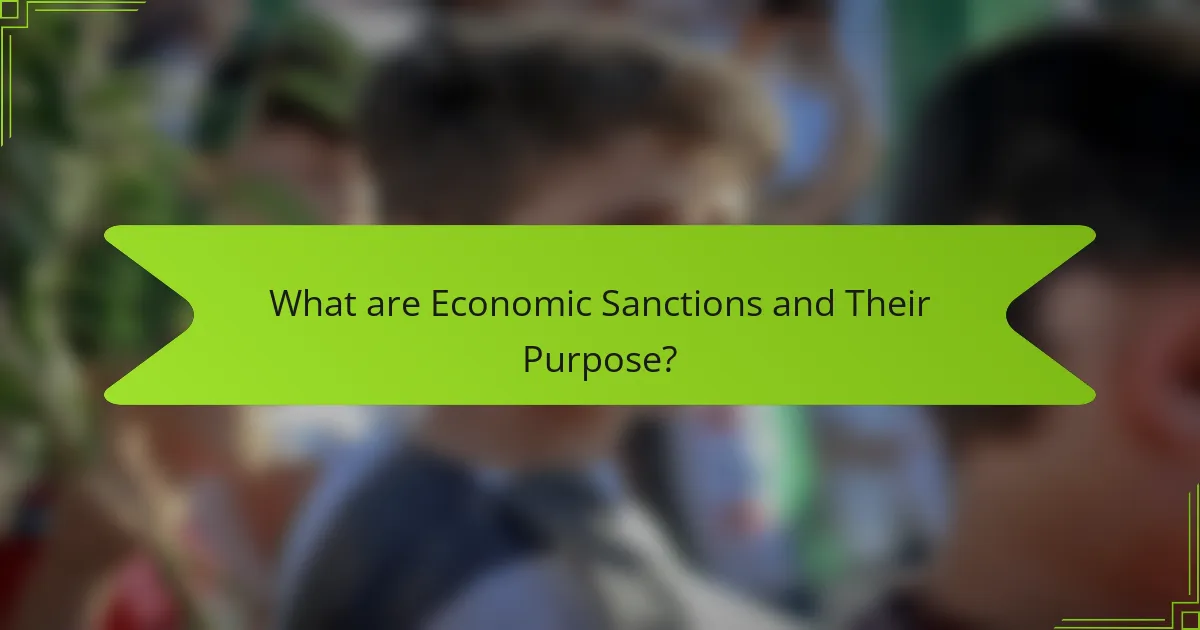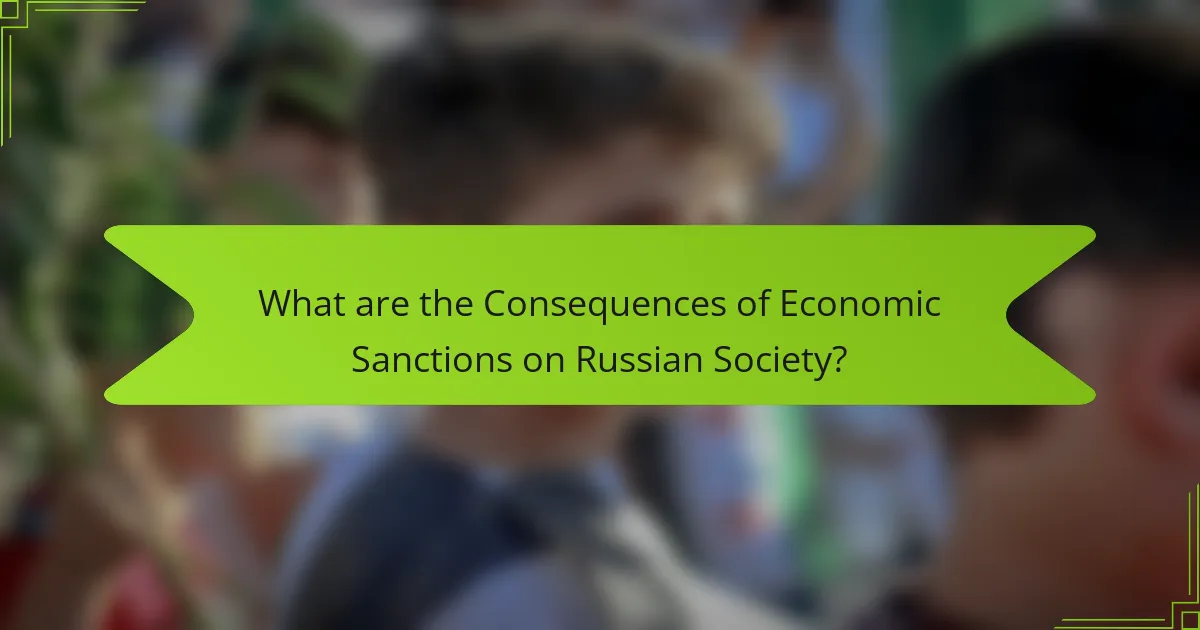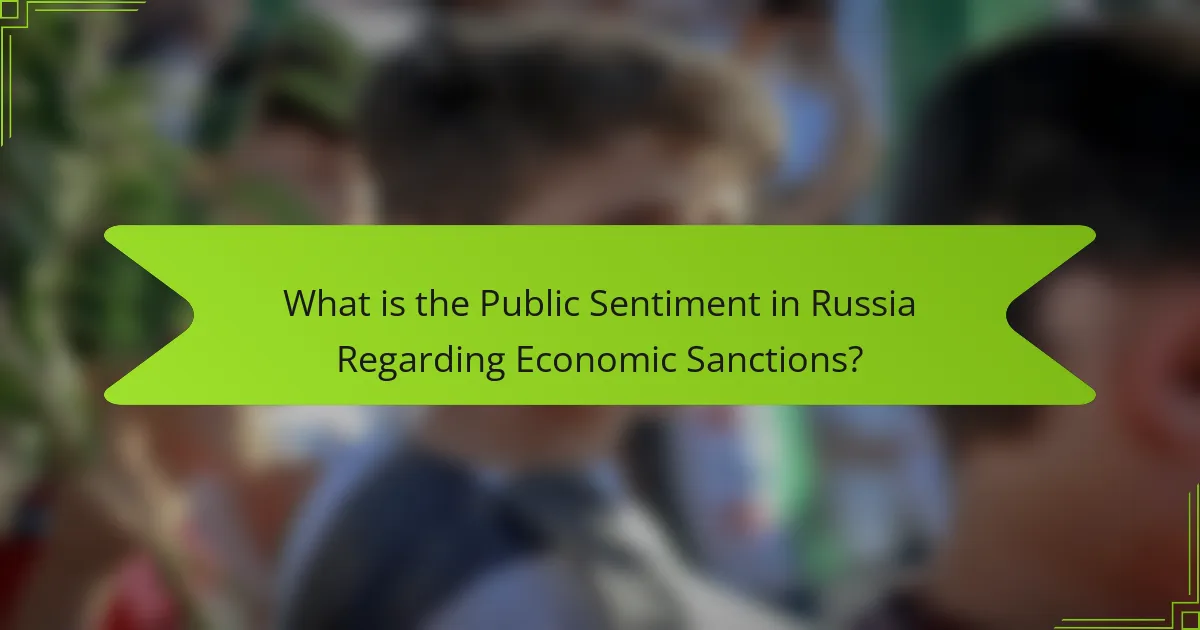Economic sanctions are restrictions imposed by countries or international organizations to influence a target nation’s behavior, often aimed at compelling compliance with international laws or norms. This article examines the impact of economic sanctions on Russian society, highlighting the significant consequences such as economic contraction, rising unemployment, inflation, and shortages of essential goods. It also explores public sentiment in Russia, which largely views these sanctions as unjust and politically motivated, with around 70% of the population opposing Western sanctions. The article discusses how these economic hardships have affected the quality of life for many Russians and shaped their perception of government actions in response to external pressures.

What are Economic Sanctions and Their Purpose?
Economic sanctions are restrictions imposed by countries or international organizations to influence a target nation’s behavior. Their primary purpose is to compel compliance with international laws or norms. Sanctions can target specific sectors, individuals, or the entire economy. They are often used to address issues like human rights violations, aggression, or nuclear proliferation. For example, the United Nations has imposed sanctions on North Korea to curb its nuclear program. Economic sanctions aim to create economic hardship, thereby pressuring the target government to change its policies. The effectiveness of sanctions can vary, depending on factors like the target nation’s resilience and the level of international support for the sanctions.
How do economic sanctions function in international relations?
Economic sanctions function as tools used by countries to influence the behavior of other nations. They typically involve restrictions on trade, financial transactions, or other economic activities. Sanctions aim to compel a change in policy or behavior, often in response to actions deemed unacceptable, such as human rights violations or aggression. The effectiveness of sanctions can vary based on factors like the targeted country’s economy and international support for the sanctions. Historical examples include the sanctions imposed on South Africa during apartheid and those against Iran regarding its nuclear program. In both cases, sanctions were intended to pressure governments into compliance with international norms.
What are the key types of economic sanctions imposed?
The key types of economic sanctions imposed include trade sanctions, financial sanctions, and targeted sanctions. Trade sanctions restrict the exchange of goods and services. Financial sanctions limit access to banking systems and financial markets. Targeted sanctions focus on specific individuals or entities, such as government officials or companies. These sanctions aim to influence behavior without affecting the general population. Historical examples include the U.S. sanctions on Iran and North Korea. These measures are often used to address issues like human rights violations or military aggression. The effectiveness of sanctions can vary based on their design and implementation.
What criteria are used to determine the effectiveness of sanctions?
The effectiveness of sanctions is determined by several criteria. These criteria include the intended goals of the sanctions. They also encompass the extent of compliance by the targeted entity. The impact on the economy and political stability of the target is crucial. Additionally, the sanctions’ ability to change behavior or policies is assessed. The duration of the sanctions and their adaptability over time also matter. Finally, the response of the international community plays a significant role in evaluating effectiveness.
What historical context led to the imposition of sanctions on Russia?
The imposition of sanctions on Russia stemmed from its annexation of Crimea in 2014. This action violated international law and Ukraine’s sovereignty. The annexation followed Russia’s support for separatist movements in Eastern Ukraine. In response, the United States and the European Union implemented economic sanctions. These sanctions targeted key sectors of the Russian economy, including finance and energy. They aimed to pressure Russia to reverse its actions in Ukraine. The sanctions were also a response to allegations of Russian interference in Western democracies. This historical context established the framework for ongoing economic restrictions against Russia.
What specific events triggered the sanctions against Russia?
The specific events that triggered the sanctions against Russia include the annexation of Crimea in 2014. This action violated Ukraine’s sovereignty and international law. Following this, Russia’s involvement in the conflict in Eastern Ukraine prompted further sanctions. The use of chemical weapons in the UK in 2018 also led to additional punitive measures. These sanctions were implemented by various countries, including the United States and the European Union. Each of these events highlighted aggressive actions by Russia on the international stage. Consequently, sanctions aimed to pressure Russia to alter its behavior. The cumulative impact of these actions established a framework for ongoing economic restrictions.
How have previous sanctions shaped Russia’s economic landscape?
Previous sanctions have significantly altered Russia’s economic landscape. They have led to a decline in foreign investment and increased isolation from global markets. The sanctions imposed after the annexation of Crimea in 2014 resulted in a decrease in GDP growth. In 2015, Russia’s economy contracted by 2.8%. The restrictions on key sectors, such as finance and energy, have hampered technological advancements. Additionally, the sanctions have prompted Russia to pivot towards domestic production and strengthen trade ties with non-Western countries. For instance, trade with China has increased, compensating for losses in Western markets. Overall, sanctions have reshaped Russia’s economic strategies and priorities.

What are the Consequences of Economic Sanctions on Russian Society?
Economic sanctions on Russia have led to significant consequences for its society. These sanctions have resulted in economic contraction, with the Russian economy shrinking by approximately 2.3% in 2022. Unemployment rates have increased, affecting millions of workers. Inflation has surged, reaching over 14% in 2022, impacting purchasing power. The sanctions have also caused shortages of essential goods, including food and medicine. Public sentiment has shifted, with increased dissatisfaction toward the government. Additionally, there has been a rise in emigration as individuals seek better opportunities abroad. The overall quality of life for many Russians has deteriorated due to these sanctions.
How have sanctions affected the Russian economy?
Sanctions have significantly impacted the Russian economy by restricting access to international markets and financial systems. The GDP of Russia contracted by approximately 2.1% in 2022 due to these restrictions. Foreign investments plummeted, with a decline of over 70% in direct investments. Key industries, such as oil and gas, faced challenges in exporting due to sanctions on technology and equipment. Inflation surged, reaching around 14% in 2022, affecting consumer purchasing power. The ruble experienced volatility, leading to fluctuations that weakened its value. Additionally, unemployment rates increased as businesses struggled to adapt to the new economic landscape. These economic repercussions illustrate the profound effects of sanctions on Russia’s overall economic stability.
What sectors of the economy have been most impacted?
The sectors of the economy most impacted by economic sanctions on Russia include energy, finance, and manufacturing. The energy sector has faced significant disruptions due to restrictions on oil and gas exports. Financial institutions have experienced limited access to international markets and capital. Manufacturing has suffered from supply chain interruptions and reduced foreign investment. According to the World Bank, Russia’s GDP contracted by 4.5% in 2022, highlighting the economic strain. The sanctions have led to a decline in foreign direct investment, particularly in the energy sector. These impacts illustrate the broad consequences of sanctions on the Russian economy.
How have inflation rates and currency value been affected?
Inflation rates in Russia have surged significantly due to economic sanctions. These sanctions have restricted access to foreign markets and investment. As a result, the supply of goods has decreased, leading to higher prices. In 2022, inflation reached approximately 14.5%, up from 6.9% in 2021. Concurrently, the value of the Russian ruble has fluctuated dramatically. Initially, sanctions caused the ruble to plummet, but it later stabilized due to capital controls. By mid-2022, the ruble was trading at around 60 rubles per dollar, showing some recovery. However, the long-term outlook remains uncertain as sanctions persist, impacting economic stability.
What social consequences have emerged from the sanctions?
Sanctions have led to significant social consequences in Russian society. Increased poverty levels have emerged as a direct result. Many families face economic hardships due to rising prices and reduced incomes. Access to essential goods has diminished, causing shortages in basic necessities. Mental health issues have risen, with increased anxiety and depression reported among the population. Social unrest has also been observed, as public protests against the government have increased. Educational opportunities have been affected, with international collaborations and funding severely restricted. Overall, the sanctions have created a challenging social environment for many Russians.
How have living standards changed for the average Russian citizen?
Living standards for the average Russian citizen have significantly declined in recent years. Economic sanctions imposed by Western countries have contributed to this decline. The Russian economy has faced high inflation rates, reaching over 14% in 2022. This inflation has eroded purchasing power, making basic goods more expensive. Additionally, real wages have stagnated or decreased, limiting disposable income. Unemployment rates have fluctuated, but job security remains a concern for many. Access to imported goods has diminished due to sanctions, leading to shortages. Overall, these factors have negatively impacted the quality of life for many Russians.
What impact have sanctions had on public services and welfare programs?
Sanctions have significantly strained public services and welfare programs in Russia. The restrictions have led to reduced government revenue. This decline in revenue affects funding for essential services like healthcare and education. As a result, many public services face budget cuts. Welfare programs also suffer from decreased financial support. The economic downturn further exacerbates poverty levels. Citizens experience increased difficulty accessing basic needs. Studies indicate a rise in public dissatisfaction due to these impacts. Overall, sanctions have created a challenging environment for public welfare in Russia.

What is the Public Sentiment in Russia Regarding Economic Sanctions?
Public sentiment in Russia regarding economic sanctions is largely negative. Many Russians perceive sanctions as unjust and harmful to the economy. A significant portion of the population believes that sanctions are politically motivated. Surveys indicate that around 70% of Russians oppose Western sanctions. Additionally, the government often frames sanctions as an attack on national sovereignty. This narrative resonates with many citizens, fostering a sense of unity against external pressures. Economic hardships caused by sanctions have led to increased support for the government. Overall, public sentiment reflects a mix of resentment towards the sanctions and support for the government’s response.
How do Russians perceive the sanctions imposed on their country?
Russians generally perceive the sanctions imposed on their country as unjust and politically motivated. Many believe these sanctions are aimed at undermining Russia’s sovereignty. Public sentiment often reflects a sense of national pride in the face of external pressure. Surveys indicate that a significant portion of the population views the sanctions as a challenge to their resilience. Some Russians also express frustration over the economic impact on their daily lives. Reports show that there is a divide in perception based on socioeconomic status. Wealthier individuals may experience less direct impact compared to lower-income citizens. Overall, the perception of sanctions is complex and influenced by various factors, including media narratives and personal experiences.
What factors influence public opinion on economic sanctions?
Public opinion on economic sanctions is influenced by several key factors. These include the perceived effectiveness of the sanctions, the economic impact on the general populace, and the political messaging from government officials. Public understanding of the reasons behind the sanctions also plays a significant role. Additionally, media coverage shapes perceptions by framing the narrative around the sanctions. Historical context, such as past experiences with sanctions, further affects public sentiment. Surveys indicate that individuals who believe sanctions are justified are more likely to support them. Conversely, those who feel sanctions harm innocent civilians tend to oppose them.
How has the government responded to public sentiment regarding sanctions?
The government has responded to public sentiment regarding sanctions by reinforcing its narrative of resilience and patriotism. It has implemented measures to mitigate the economic impact of sanctions on citizens. For instance, the government has increased social welfare programs to support vulnerable populations. Additionally, it has promoted domestic production to replace imported goods affected by sanctions. Public messaging has focused on unity and the necessity of sanctions resistance. Surveys indicate that a significant portion of the population supports the government’s stance against Western sanctions. This support is often reflected in state-sponsored media campaigns emphasizing national pride.
What role do media and propaganda play in shaping public opinion?
Media and propaganda significantly influence public opinion by controlling the flow of information. They shape perceptions through selective presentation of facts and narratives. For instance, state-controlled media in Russia often emphasizes national pride and security. This approach can lead to a unified public stance against perceived external threats. Research shows that consistent messaging can reinforce existing beliefs and attitudes. The Pew Research Center found that people exposed to state media are more likely to support government policies. Thus, media and propaganda play a crucial role in molding public sentiment, especially in the context of economic sanctions.
How does state-controlled media portray the impact of sanctions?
State-controlled media portrays the impact of sanctions as largely negative for the economy and society. It emphasizes the hardships faced by citizens due to rising prices and scarcity of goods. The narrative often includes claims that sanctions are unjust and politically motivated. Reports frequently highlight the resilience of the Russian people in overcoming these challenges. Additionally, state media tends to downplay any economic downturns by attributing them to external factors. This framing aims to foster a sense of national unity against perceived foreign aggression. The portrayal is consistent with the government’s broader messaging strategy to maintain public support.
What alternative narratives exist regarding the sanctions and their effects?
Alternative narratives regarding sanctions and their effects include the belief that sanctions strengthen national unity. Some argue that they rally citizens around the government. Another narrative suggests that sanctions have minimal impact on the elite, who remain insulated. Critics also claim that the humanitarian consequences are overstated. They argue that the government adapts and finds alternative trade partners. Additionally, some narratives posit that sanctions can provoke anti-Western sentiment. This sentiment can reinforce support for the government. These perspectives challenge the mainstream view of sanctions as purely detrimental. They highlight the complexity of sanctions’ effects on society.
What insights can be drawn from public sentiment about future sanctions?
Public sentiment about future sanctions indicates a growing skepticism among citizens. Many believe sanctions may exacerbate economic hardships. Surveys show that a significant portion of the population feels sanctions disproportionately affect ordinary people. Additionally, there is a perception that sanctions may not lead to political change. Historical data from previous sanctions suggest mixed outcomes on governance. Public opinion reflects concerns over national sovereignty and resilience. Citizens express a desire for diplomatic solutions over punitive measures. This sentiment can influence policymakers’ decisions regarding future sanctions.
How might public opinion influence future policy decisions regarding sanctions?
Public opinion can significantly influence future policy decisions regarding sanctions. Policymakers often consider public sentiment when determining the effectiveness and continuation of sanctions. A strong public outcry against sanctions may lead to a reevaluation of their impact. For instance, if citizens perceive sanctions as harmful to their economy, they may demand policy changes. Conversely, if public opinion supports sanctions, it can strengthen government resolve to maintain them. Historical examples show that public protests and grassroots movements can lead to shifts in foreign policy. In the context of Russia, surveys indicate varying levels of support for sanctions based on their perceived impact on everyday life. Thus, public opinion serves as a barometer for policymakers in shaping future sanctions strategies.
What strategies can be employed to address public concerns about sanctions?
Engaging in transparent communication is a crucial strategy to address public concerns about sanctions. This involves providing clear information on the reasons for the sanctions and their intended goals. Regular updates can help mitigate misinformation and build trust.
Offering forums for public discussion allows citizens to express their concerns and ask questions. This can lead to a better understanding of the sanctions and their implications. Involving community leaders in conversations can also enhance credibility and reach.
Implementing targeted support programs for affected populations can alleviate negative impacts. These programs can include financial assistance or job training initiatives. Demonstrating a commitment to help those most affected can reduce public anxiety.
Lastly, showcasing positive outcomes from sanctions can help shift public perception. Highlighting instances where sanctions have led to diplomatic progress or improved human rights can reinforce their purpose.
The primary entity of this article is the impact of economic sanctions on Russian society. The article explores the causes of these sanctions, particularly focusing on Russia’s actions in Crimea and subsequent international responses. It outlines the consequences of sanctions on the Russian economy, including inflation, unemployment, and decreased living standards, while also examining the social ramifications such as increased poverty and public sentiment. Additionally, the article analyzes how public opinion is shaped by media narratives and government responses, providing insights into the future of sanctions and their potential effects on policy decisions.